To know the language
means to produce
a potentially infinite number of language units,
having a finite set of rules.
Noam Chomsky
The following Action Research was based on real classroom experience while teaching mixed-ability students of Grade 7. I’ve decided to investigate the influence of grammar accuracy on effective oral and written communication because every day more and more students in my classroom face the problem of expressing themselves correctly without mistakes. According to Noam Chomsky, “among all autonomous branches of linguistics, such as phonetics, morphology, semantics and others, the central part should be given to grammar”. First of all I must say that in accordance with the existing course plan the main part of the lesson should be devoted to developing language skills, such as listening, reading, writing and speaking. And undoubtedly it’s reasonable if we keep to the point that communication is the key objective of teaching but … as it turned out the more fluency we develop the better grammar we need. Very often most students can’t say a word in English even if they know topical vocabulary quite well. They can hardly use grammar at least at the level of simple utterance.
The second problem was that all the students Grade 7 had different levels of English. It was their first year of studying at Nazarbayev Intellectual School, Pavlodar, Kazakhstan, so they all needed differentiated approach according to their abilities. So I also decided to research the problem of differentiation, so that I would be able not only to support less-able students, but also provide enough freedom for talented and gifted children. That was another serious task to solve.
The hypothesis of the research: if we use differentiated approach for selecting grammar exercises for different students, their grammar skills will improve the level of their speaking and writing.
To formulate the research question I used several special strategies, such as “Wheel of Balance” and “PICOT”, which helped me to focus on important areas, find the balance and have a so called “helicopter view” of my teaching practice. Among other methods of research are: the analysis of different sources, working-out of effective exercises on Past Simple Active and Passive, observation of students’ performance, assessment and reflection.
The first cycle of this Action Research took almost the whole term, i.e. nearly 3 months and during this period we focused on such grammar issues as Past Simple Active and Passive, because the topics we studied were closely connected with them. At first the students needed Past Simple Active to describe the plot of their favourite film (Topic: Entertainment and Media), then they had to use Past Simple Passive to speak and write about different natural disasters around the world.
The objectives were:
1) To investigate the ways of differentiating tasks, according to the level of students;
2) To try different methods and strategies of developing English grammar skills (Past Simple Active and Passive) in practice (through a series of lessons);
3) To research the influence of grammar skills on effective communication (both speaking and writing).
I also wanted to research the following questions:
1) Why can’t students communicate even if they know their topical vocabulary?
2) Why do they have difficulties in understanding the content and reacting on questions?
3) How can I as a teacher differentiate grammar tasks according to the level of each student?
4) Can I make grammar tasks more communicative?
5) How should I assess my students’ communicative skills?
After analyzing students’ reflection cards from the previous terms I realized that first and foremost they need to understand the syntax, how to make correct sentences (both affirmative and interrogative ones), using a limited range of vocabulary items (at least those connected with the topic of the lesson).
As for differentiation I decided to observe three different students of different levels:
Student A – a very active girl with a number of well-developed English skills and high internal motivation to study. She is hard-working, independent and sociable, actively participates in all classroom discussions. So she needs further guidance to develop critical thinking and creativity through task-based learning and project work.
Student B – also a very friendly girl, active but a bit shy. She usually understands clearly the objectives of the lesson; participates actively but mainly fulfilling independent written tasks. She is very accurate, responsible and motivated, but she faces difficulties in oral communication.
Student C – a very active boy, but a little bit absent-minded. He definitely has great linguistic abilities, but he is not enough motivated. Very often he does his tasks intuitively and cannot explain his choice. He needs more theory as well as practice and constant guidance to develop full creative potential.
All the students are considered to be talented and gifted according to the results of the entrance test but have different levels of English and different skills.
For grammar differentiation I took “Grammar Skills”, written by Rosemary Allen, Learners Publishing, a division of Scholastic. It’s a series of six books, which have the same grammar topics, but the context is different. All the tasks were divided according to a number of “stars”: from 1 to 4. The students were let to choose any task in accordance with their abilities. Some of them decided to start with the easiest task, others preferred more challenging ones. Their practice was followed by Final and Achievement tests.
The results are shown in the table:
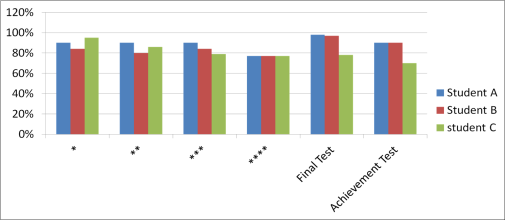
It should be pointed out that all three students started with the most difficult task. Then having analyzed their mistakes they did “Stars 1, 2 and 3” and as a result got more profound understanding of the topic. The results of the Final and Achievement tests again proved the effectiveness of using differentiated grammar tasks at all stages of preparation.
Finally I wanted to check the students’ productive communicative skills, so I gave them speaking and writing tasks. Here I again saw that the number of grammar mistakes seriously reduced and all three students were able to express their ideas and opinions without difficulties.
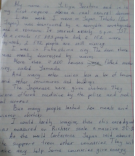
Written Practice (Student B)
![]()
![]()
![]()
![]()
![]()
![]()
![]()
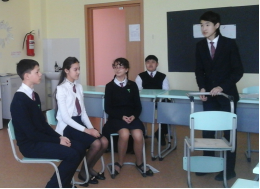
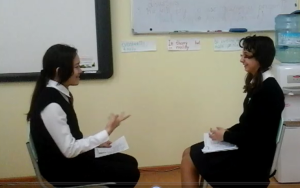
Speaking Practice (Students A, B and C)
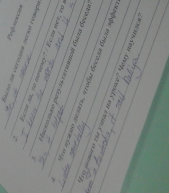
Reflection (Student A)
Results:
1) Many students have problems with speaking and writing because they don’t understand how to combine words to make a proper sentence.
2) There are many ways of differentiating the course plan in terms of grammar, such as deepening, acceleration, developing creativity and divergent thinking, problem-based learning and others;
3) More-able students, working in groups and pairs together, solve learning tasks more effectively and communicate more successfully both in a written and oral forms;
4) Less-able students get more effective scaffolding from the teacher when they are divided according to their gaps in knowledge and are able to evaluate their zone of development themselves;
5) All students realize the importance of syntax (they can make simple sentences and combine them in a short text). They are aware of rules and they easily operate them in real-life situations.
Conclusion: such kind of grammar practice really gave much food for thoughts, during the research it has proved to provide success in boosting students’ English skills, It’s given them extra freedom and more autonomy in their communication.
References:
- Chomsky N. Aspects of the Theory of Syntax. – MIT press, 2014. – Т. 11.
- Allen Rosemary. Grammar Skills (1 - 6). - Learners Publishing, a division of Scholastic, 2015
- Brydon-Miller M., Greenwood D., Maguire P. Why action research? //Action research. – 2003. – Т. 1. – №. 1. – С. 9-28.
- Mills G. E. Action research: A guide for the teacher researcher. – Prentice-Hall, Inc., One Lake Street, Upper Saddle River, New Jersey 07458, 2000.
- O'Brien T., Guiney D. Differentiation in teaching and learning: Principles and practice. – New York: Continuum, 2001.







